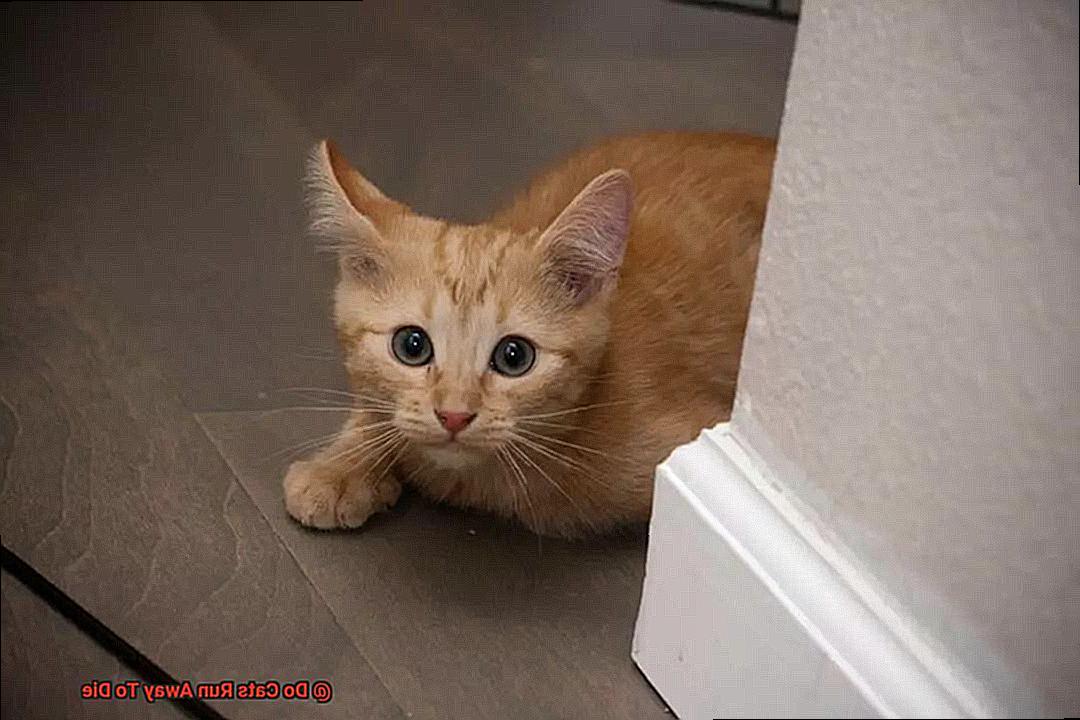Do cats run away to die? It’s a question pet owners have asked for generations. The answer isn’t straightforward—there are many variables that could affect a cat’s decision to leave its home in search of death. In this blog post, we’ll explore why cats may choose to do this and what you can do if your cat goes missing.
We’ll look at feral cats’ behavior as well as the psychological needs of domestic cats. By the end, you’ll have a better understanding of why cats may run away and how to help if your beloved feline goes missing.
So get comfortable, grab a cup of coffee, and let’s dive into the fascinating world of cats running away to die!
Common Misconceptions About Cats Running Away
In reality, cats can flee due to fear, stress, or disorientation caused by illness or injury. Furthermore, they may not be able to locate a safe spot if they are too sick or injured.
Another misbelief is that cats will always find a safe place to go when they are dying. This simply isn’t true; cats can easily become lost and confused during their search for safety and may not make it in time.
Lastly, some people think that cats will always come back home before death. Unfortunately, this isn’t always the case. Cats may be too weak or disoriented to travel back home before passing away.

It’s important to remember that cats don’t run away to die out of spite or because they don’t want to be a burden on their owners. Most of the time, there’s an underlying medical condition causing them to seek safety and security elsewhere.
Reasons Why Cats Run Away To Die
Death is an inevitable part of life, and cats are no exception. Unfortunately, cats may sometimes choose to run away and die. While this can be a heartbreaking experience for pet owners, there are some potential reasons why cats may take this route.
A painful illness is one possible explanation. Cats are independent animals and may want to find a quiet place away from their family in order to pass away peacefully if they are suffering from a terminal or painful disease.
Fear of rejection could also be a factor. Cats are highly sensitive creatures and can pick up on the emotions of their owners. If they feel rejected or scared by the unknown, they may become scared and isolated, leading them to run away in search of a peaceful place to die.
Finally, cats may also choose to run away if they have lost interest in their home environment or spending time with their family. Cats thrive on routine and can become bored with their daily lives after some time, prompting them to seek out new places and experiences in order to find peace before passing away.
What To Look For If Your Cat Run Away
It’s essential to be aware of the warning signs that could indicate this is happening.
To begin with, pay close attention to any signs of illness. Common symptoms such as loss of appetite, lethargy, vomiting, and diarrhea can all point towards an underlying health issue that may lead to death.

Also keep an eye out for changes in behavior; if your cat is suddenly more or less active than usual or is hiding more often than normal, these could be signs that something is wrong.
In addition, changes in grooming habits are also important to look out for; cats are meticulous groomers and will stop grooming themselves if they are feeling ill or weak.
Secondly, look out for signs of depression. Cats can become depressed when they are feeling unwell or when their environment has changed significantly (such as a move). If your cat seems unusually sad or withdrawn, it could be a sign that they are planning on running away to die soon.

Thirdly, if your cat is an outdoor pet, keep an eye on its movements; it may wander further away from home than normal if it is searching for a place to die in peace and privacy. In addition, some cats may try to escape from the house if they feel like their end is near, so make sure you monitor them closely if you suspect something might be wrong.
Finally, certain behaviors such as excessive grooming or meowing more than normal can also indicate that a cat is about to pass away soon. Disorientation and aggression are also warning signs that should not be ignored. If you notice any of these behaviors in your pet, please take them to the vet right away for a check-up.
Indoor vs Outdoor Cats
When it comes to running away to die, indoor and outdoor cats have very different tendencies. Indoor cats are typically content to remain in the safety of their home and do not feel the need to wander off when they sense that death is near.
However, if an indoor cat is elderly or ill, it may choose to hide away in a quiet corner of the house as it approaches its final moments.
Outdoor cats, on the other hand, are more likely to seek solitude when they sense that death is near due to their instinctual desire for peace and privacy at this time.
They may also be drawn to wander off if they are feeling weak or unwell as they look for a secure place where they can rest and die in peace.
It is essential for both indoor and outdoor cat owners to be aware of any changes in their pet’s behavior so that they can monitor them closely and provide comfort as needed.
Additionally, owners of outdoor cats should ensure that their pet has access to a safe area where it can find shelter and comfort if necessary.
6. What To Do If You Suspect Your Cat Is About To Run Away To Die
If you suspect your beloved cat is about to run away and die, it is essential to take action as soon as possible. The first step should be to take them to the vet for a check-up; this will help rule out any medical conditions that may be causing them pain or distress.
Additionally, ensure your cat has access to food, water, and a comfortable place to rest. Offering extra love and affection can also make them feel more secure and less likely to run away.
If your cat does end up running away, contact local animal shelters and wildlife control officers immediately.
They may be able to assist you in locating your pet quickly. You can also consider installing a humane trap in the area where your cat may have gone missing or hiring a pet detective who specializes in finding lost cats.
Finally, consider getting an ID tag or microchip for your cat so that if they do wander off, they will be easier to identify and return home safely. If anyone discovers them, they will know who their owner is and how to get in touch with you right away.
Where Do Cats Go When They Are About To Die?
It’s a difficult question to answer, but there’s one thing we do know: cats have an innate desire for seclusion and security when the time comes for them to say their goodbyes.
Cats will often seek out a quiet, familiar spot that is comfortable for them. This could be anywhere, from under furniture, behind appliances, in closets, or even outside under a porch or deck or in the shade of a tree. It’s essential for pet owners to recognize the signs that their cat is close to death and make sure they have access to these types of places so that they can pass away peacefully.
No one likes thinking about their pet’s death, but knowing where cats go when they are about to die can help us provide our furry friends with the best possible goodbye. If your cat is spending more time looking for a quiet spot, it may be a warning sign that they are close to leaving us.
Conclusion
In conclusion, it’s heartbreaking when cats run away to die. Although we can’t always know why they choose this path, there are certain signs that can alert us to our beloved pet’s intentions.
To give them the best care and support possible during this difficult time, keep an eye out for any changes in behavior or signs of sickness or depression.
Also, make sure your cat has safe areas where they can find peace and seclusion if needed.
By being aware of these warning signs and taking the right action, we can ensure our furry friends get the love and assistance they need before they peacefully pass away.







